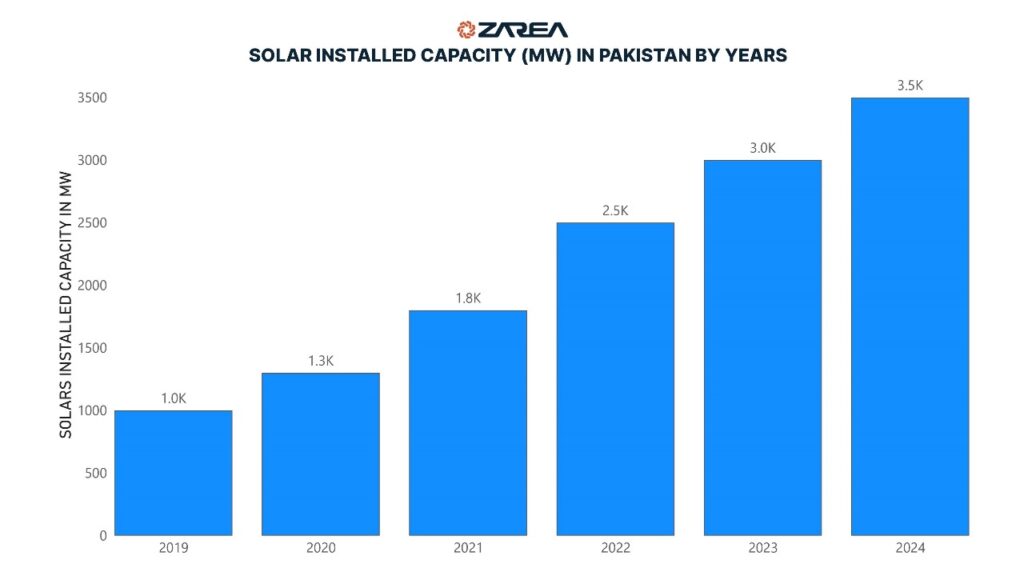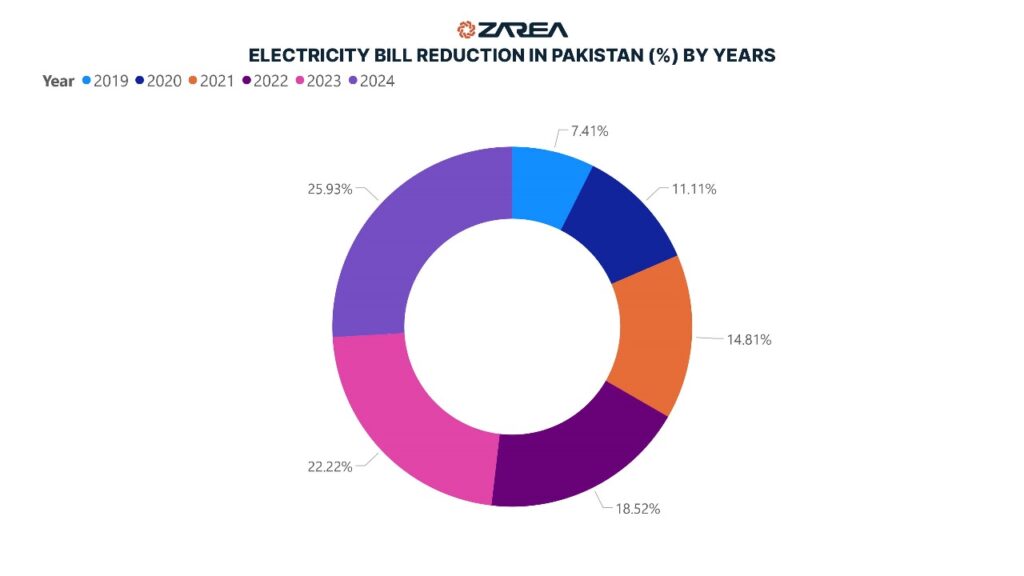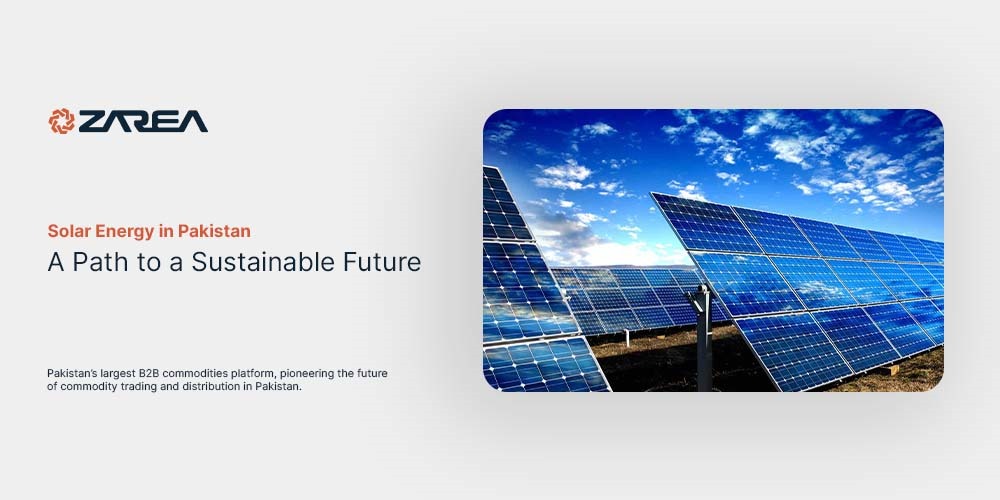Introduction – Solar Energy in Pakistan:
The energy released from the sun is termed solar energy. Solar energy can produce heat and chemical processes. It may also be converted into electrical energy. Pakistan is privileged with ample sunlight, and on this count, the state is in an ideal shape to harness solar energy.
With increasing energy demands, coupled with recurrent and irritating power outages and dependence on highly expensive fossil fuel imports, solar energy provides a sustainable solution at a reasonable cost. It not only meets the energy demand but also helps conserve the environment by reducing carbon emissions.
At Zarea, we aim to be instrumental in Pakistan’s journey toward sustainability. We offer a range of top-quality solar panels along with associated equipment, presenting homeowners and businesses with cleaner and more reliable energy solutions. Innovation and customer satisfaction are two core ethics at Zarea.
Current Landscape of Solar Energy in Pakistan:
Solar energy in Pakistan adoption has developed a lot in country over the years. The country, being in an excellent position to generate solar power with more than 300 sunny days per year, has introduced various incentives. These include:
- Net metering policies
- Exemptions of duty on solar equipment
- Subsidies to promote renewable energy
Nonetheless, obstacles like the upfront setup expenses, insufficient awareness, and poor infrastructure have impeded growth. In spite of these challenges, heightened investment and collaborations between public and private sectors have driven the uptake of solar energy in residential, commercial, and industrial sectors.
Pakistan Solar Energy Market Trends:
Solar Energy Conversion Methods
Solar energy is converted into electricity through:
- Photovoltaic (PV) systems (direct methods)
- Concentrated solar power (indirect methods)
Technological advancements and reduced module costs have made these methods more affordable.
Dominance of the Utility Sector
The utility industry is anticipated to maintain its lead in Pakistan’s solar energy market because of falling solar module prices and a growing number of large-scale initiatives.
Government Initiatives and Renewable Energy Targets
The government of Pakistan has set bold renewable energy goals, targeting 30% of the country’s energy to be derived from renewable sources by 2030. The Alternative Energy Development Board is spearheading initiatives to construct solar power plants across the country.
Increase in Solar Capacity
The International Renewable Energy Agency (IRENA) reports a 17% rise in Pakistan’s solar capacity since 2021, with continued growth expected through 2024 due to new and ongoing projects.
Significant Projects and Collaborations
- Orient Energy Systems and JA Solar Collaboration: Established Pakistan’s first n-type utility-scale photovoltaic power plant at Lucky Cement plant (26 MW), with further upgrades planned for 2024.
- Hanersun Technologies and My Energy Partnership: A solar system project with a capacity of 500MW commenced in March 2024, involving an investment of around USD 700 million, showcasing Pakistan’s dedication to solar energy development.

Pakistan Solar Energy Market Outlook (2024-2029):
Market Growth Projections
The Pakistan solar energy market is projected to grow significantly, from an installed capacity of 1.41 GW in 2024 to 9.53 GW by 2029, at a CAGR of 46.55%.
Key Growth Drivers
- Increased Adoption of Solar PV Systems: A rising trend of installations across the country.
- Declining Costs: Reducing expenses for solar panels and their installations.
- Environmental Concerns: Heightened understanding of the ecological effects of fossil fuels.
Market Challenges
- Transmission and Distribution Losses: Significant technical efficiency losses.
- Need for Stable Policies: Absence of a solidified renewable energy policy.
- Continuity of Power Supply: Reliability concerns due to unpredictable supply.
Emerging Opportunities
- Abundant Solar Irradiance: High solar irradiance year-round in key regions.
- Foreign Investment: Vital for infrastructure development.
- Off-Grid Solutions: Expansion of micro- and mini-grids to rural areas.
- Renewable Integration: Improved stability and capacity through renewable grid integration.
Why Solar Energy is Crucial for Pakistan:
Solar energy is capable of acquiring much significance with regard to the vital challenges of the people of Pakistan: those dealing with the energy crisis and expensive imported fossil fuel. Indeed, having over 300 clear days a year in this vast arid part of the region really spells great potential in regard to solar energy conversion.
Key Benefits
- Cost Reduction: Lower electricity costs for homes and industries.
- Environmental Conservation: Significant reduction in greenhouse gas emissions.
- Energy Security: Reduced reliance on imports, improving national energy independence.
- Economic Growth: Creation of job opportunities in manufacturing, installation, and maintenance.
- Empowered Communities: Supplying power to distant regions, enhancing progress.
Solar Energy Feasibility for Homes and Businesses:
The installation of solar panels is becoming more practical for households and companies in Pakistan. With declining equipment costs and financing options, even small-scale users can adopt solar systems.
Key Factors Affecting Feasibility
- Geographic Location: Areas with high solar irradiation are more suitable.
- System Size: Customized systems provide optimal cost-efficiency.
- Payback Period: Cost recovery is typically achieved within 3-5 years through savings on electricity bills.
At Zarea, we simplify this transition by offering reliable and cost-effective solar solutions, along with expert consultation and installation services.
Solar Panel Options at Zarea:
We provide the following solar panels:
- Longi Solar Panel (for price and more detail click here)
- JA Solar Panel (for price and more detail click here)
- Canadian Solar Panel (for price and more detail click here)
- Trina Solar Panel (for price and more detail click here)
- Jinko Solar Panel (for price and more detail click here)
- Astronergy Solar Panel (for price and more detail click here)
Electricity Bill Reduction in Pakistan by Using Solar Energy:
The high cost of solar electricity in Pakistan, besides reoccurring power outages intermittently, has made solar sensible as an alternative to minimizing electricity bills. Solar electrification allows both domestic sections and the business sector to enjoy self-produced electricity, and this reduces monthly energy demands by a large fraction among consumers.

How Solar Energy Reduces Electricity Bills:
- Net Metering: Surplus electricity produced by solar panels can be returned to the grid, generating credits that reduce electricity use during times without sunlight.
- Energy Independence: Solar energy decreases reliance on the grid, making monthly electricity expenses more stable even with varying rates.Low Maintenance
- Costs: Solar panels require minimal maintenance, further saving costs in the long term.
Financial Impact on Households and Businesses:
Households adopting solar energy report 50-70% reductions in monthly electricity bills.
Businesses benefit from lower operational costs, improving profitability and competitiveness.
With affordable financing options and incentives, solar energy is becoming increasingly accessible, offering a sustainable solution to Pakistan’s energy challenges while reducing electricity expenses.
Conclusion – Embracing Solar Energy for a Better Tomorrow:
Solar energy is something that really gives a bright future to Pakistan due to the enormous amount of natural resources. Awareness among the public has added solar energy as an imperative to solving the energy problems in the country.
At Zarea, besides inculcating the culture of sustainable energy into our ways, we have a serious commitment to make this transition a reality with innovative solar solutions. Let’s power progress together, and together let’s build a better tomorrow for our future generations.
FAQs:
Why is solar energy important for Pakistan?
One of the most attractive benefits is the affordability of solar energy in Pakistan. As prices for solar panels continue to plunge and more accessibility, a person and business alike have the chance to cut in on their electricity bills by reaping the energy from the sun.
What is the importance of solar energy?
Solar energy is essential because it offers a clean, renewable power source, decreasing dependence on fossil fuels and lessening environmental harm.
What is the scope of solar energy in Pakistan?
Solar energy has begun to gain traction in Pakistan, and it is regarded as a key solution for the country’s continuously rising energy demands.
What is the future of solar in Pakistan?
With ongoing investment from both local and international sources, along with favorable government policies, the future of solar energy in Pakistan looks promising and offers significant potential for further growth and advancement toward the nation’s renewable energy objectives.

































